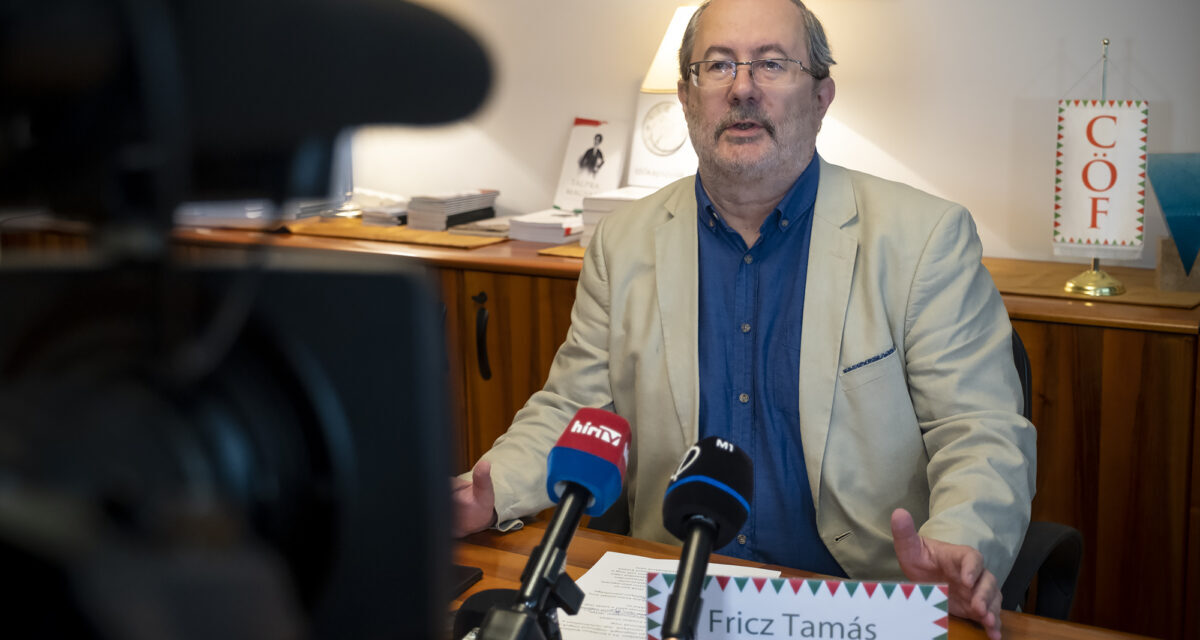We are confident, but at the same time somewhat uncertain, as the European Parliament elections in June approach. Is there a chance for change, or are more bitter, perhaps fatal years ahead? What do we do, what can we do if the worst case scenario occurs? Our portal asked political scientist Tamás Fricz about concerns and opportunities.
The European Union seems to be either playing a game of pull it, loosen it, or is in a state of total confusion. Once they send some money, then they throw a breach of duty procedure down our necks, and then they almost beg Viktor Orbán to go out for coffee so that he doesn't prevent the start of the accession negotiations with Ukraine, but they tie us into our child protection law and sovereignty laws. So how are we now with this European Union?
I think we have reached a watershed, and we are already there. Recently, the fate of the Union has been decided, in which direction it will turn. This is what the June election will be about. The stakes are huge, isn't it clear that two main directions are competing with each other. One is the certain mainstream line, which unfortunately is in the majority at the moment within the Union, and which wants a super-federal Union. We can call this the United States of Europe, a kind of American model, but in my opinion they want an even more centralized structure. They are the leftists, liberals, greens, that is, the globalists, who are also in the majority in the European Commission.
The other side is made up of the sovereignists, the parties and governments based on national sovereignty, which want the European Union not to be a hierarchical, centralized super-state, but to be a Europe made up of strong nations, where the nations decide their own destiny, not a Brussels super-government.
These two trends are in tension with each other. Currently, the globalist majority is attacking the sovereignists, most notably Hungary, the Hungarian government, because we persistently resist the super-federal aspiration. While Kaczyński's Law and Justice party governed in Poland, they were also among those who could be attacked, but look at the miracle, as soon as Donald Tusk took power, who absolutely classifies it in the federal direction, at that moment there is nothing wrong with Polish democracy, the rule of law, suddenly the money taps were also opened. So, in a sense, we were left alone. However, the future of not only Hungary, but the whole of Europe is at stake, which is why we will be somewhat smarter after the European Parliament elections.
Do you believe that the Union's policy can change completely after that?
It is certain that whatever the outcome, the fight will continue even after this. Don't be wrong, but I'm afraid that a radical, earthquake-like transformation is not expected, but we can trust that the sovereignist side will at least get stronger, and it is very, very important that it gets stronger. That's why it has reality.
As for the events in Poland, we cannot object to what happened, since, according to the EU globalists, democracy invaded there. It is true that with somewhat dictatorial means, but who cares about such trifles in Brussels?
On the contrary, as I see it, nothing else is happening except that Poland is becoming Büsselized. The leadership of the Union is increasingly acting as a dictatorial body, exactly as Moscow did in Soviet times. Only rougher. They flout EU rules without batting an eye and now openly want to impose illegal migration, gender theory, and globalist interests on us.
Indeed, this is one of the most important problems. For years, we have seen that they have broken the laws they created one after another, it is enough to mention only the Sargentini report. They wouldn't have had the required two-thirds, so they pretended that the people staying there weren't even there. This is a violation of the most basic democratic voting rules.
This is just one amazing example out of many. The European Commission goes far beyond its role, rudely meddling in issues that fall within the competence of the member states according to the basic treaties of the European Union. They make illegal decisions and initiate baseless misconduct proceedings in matters that they have nothing to do with.
Surprising?
Not at all, since their goal is to transform the European Union. For a while, we said that they were stealthy with the withdrawal of powers, but there is no longer any talk of stealth, they attack openly. In 1999, Jean-Claude Juncker, who had sciatica, already spoke out when he explained in an interview to Spiegel that this federal process is done by taking a small step, making a decision, if there is no resistance, then it is enshrined in legislation and from then on it is already it works. So they test the limits and move forward. This is not such a slow process anymore, events have sped up.
Recently, the representatives of the Polish and Belgian sovereignist parties met in the European Parliament and established that in the background the left-liberals belonging to the so-called mainstream are consciously and methodically preparing the transformation of the EU treaties, i.e. their comprehensive and radical reform in the direction of federalism. The mainstream press is deeply silent about this.
One Polish representative called the process a constitutional coup, as they want to take away the most basic European member state rights from areas such as education, taxation, healthcare, border protection issues, foreign policy, domestic policy. And in order for the globalist majority to be able to do anything, they also want to remove the right of veto, which has so far provided some guarantee that even if we were left alone, we eventually managed to prevent decisions that were unacceptable to us in several cases.
Another dangerous decision was made, which was not much discussed at home. The Legal and Constitutional Affairs Committee of the European Parliament adopted a report in October last year, which called for European Union Community law to be placed above national law, i.e. essentially to have priority over national legislation.
If I understand correctly, nothing else is happening, except that a dictatorship seems to be emerging?
There are those who subtly call this governance above nations, but I don't. If a country's sovereignty and decision-making rights cease and others can exercise it, then it is a dictatorial system. What is really shocking is that this aggressive globalist effort also has domestic supporters, for example the strange group called the Democratic Coalition, but it is neither democratic nor a coalition.
Ferenc Gyurcsány and his party essentially identify one hundred percent with the ideas that the European Union mainstream wants, and there are quite a few left-wing parties in Hungary, almost all of which, with the exception of Mi Hazánk, for example, think the same way.
Ferenc Gyurcsány is a communist fossil left here. It is very unfortunate that he is still here in our lives and it is unfortunate that he plays a role in politics at all and can lead the left. I think he can lead you astray, even though he's not really leading you anymore, he's been ruining it for years. And these unfortunate smaller left-wing and left-liberal parties don't realize it, don't want to realize it, or are simply incapable of setting up any alternative to it. The primary tragedy of the current parties, which perhaps deserve more, is that the shadow of the Gyurcsánys is absolutely cast over them.
As for globalist intentions, it is clearly the downsizing of nation-states, not even on the model of the USA, because in the United States of America, the member states have more rights and independence, despite the federal system, than they would have in something communist and dictatorial in Europe.
Knowing all this, what should be done with the Union? What can it be at all?
I think Viktor Orbán has already said this: we must not move out of the Union, but inward.
This sentence needs to be interpreted, because I think it means that we have to stay inward in order to shape the community according to our principles, that is, to shape a Europe based on a community of sovereign, strong nation-states. Two years ago, I made a comment that was disputed by many, that the idea of Huxit cannot be discarded, because although we do not have to and should not strive for it, a situation may arise where this may be the lesser evil. Today, I believe that if we were to withdraw, the "remaining" 26 member states would be even closer to the tragic outcome, towards a global Europe, a community with a super-federal, dictatorial system. We must fight together so that the Union does not become unlivable, a real communist dictatorship.
By the way, the globalist aspiration is - regrettably - not yesterday's invention.
Of course, the founding fathers already planned for this, that is, for it to be something super-federal. Altiero Spinelli, a black-belt communist, or Walter Hallstein in the 1960s, who fought a fierce battle with De Gaulle and it was only thanks to the French that he managed to keep the veto, testified to this. So, from the very beginning, the EU was intended to be super-federal, which means that the struggle within the association has been going on for a long time, only now it has accelerated. By the way, the majority of the leaders of the Union are federalists.
Ursula von der Leyen, who re-applied for the position of President of the European Commission, is very much connected to the Davos society.
So behind it all is not just a Brussels elite, but a global elite that dominates the Brussels leadership, and they implement the ideas of the global elite. In any case, they are thinking about world governance, an important part of which would be the establishment of this particular European super-government.
Of course, the main point is, and this is the main reason for concern, that there are countless examples when, in matters where the European Council, i.e. the Council of Ministers and Heads of State, would have decision-making powers, this was neatly bypassed, taken to a lower decision-making level and from then on, even though it is illegal, still they want to see these decisions through.
Moreover, these insidious maneuvers would not only become rarer, but on the contrary, they are becoming more frequent. In contrast, the cooperation of the V4s was relatively effective, but let's face the facts, at the moment the V4 is not functional.
If it is a question of the cooperation of four countries, there is no doubt that the Polish-Hungarian axis was the real engine of the V4s. We can't expect that now, although the Slovaks might stand by us...
Unfortunately, Poland now has a course opposing the Orbán government, and we know that Dunald Tusk is not a great friend of Viktor Orbán, to say the least. Fico's cannot be said to be perfect comrades-in-arms, although they side with us in many cases, but at other times they side with the majority, of course according to their own well- or poorly-perceived national interest. That is, you can't count on them for sure.
The more questions are discussed, the more worrying I see our situation. What can we do against globalist pressure? What could we do if our basic rights were taken away from us?
We can hope that other member states will realize sooner or later that the withdrawal of rights is unacceptable for them as well, it puts not only the Hungarians, but also them in an impossible situation. If our sovereignty ceases, then theirs will also cease and the situation we know because we have experienced it, and they have not yet, will arise. And don't even recognize it, because that would mean absolute vulnerability like the Soviet Union.
There must be a red line that cannot be crossed.
Consider, for example, that our child protection law is at the European Court of Justice and they may soon make a decision that is unacceptable to us, because it would oblige us to repeal the law. There is no way we can do this, because if we renounced it, we would also renounce the future of our children and grandchildren. And this is just one example out of many.
However, the decisions of the European Court of Justice are binding in principle, which is tragic because based on their decisions so far, it is clear that the company is a loyal servant of the globalist elite.
Just like the European Parliament and the Commission, the European Court of Justice also extends far beyond its powers. It makes decisions that are unacceptable to us in matters that are under the scope of national law. This view began to develop in the sixties, or more precisely, they began to enforce it, because they believe that European law is superior to national law. There is a moment when resistance is inevitable, when we have to say that we simply do not carry out their decisions. Then it will become clear whether we will have followers, what effect our resistance has on the processes.
The Orbán government has already proven that results can be achieved with a courageous stand, and our prime minister has also gained authority. Again, who knows how many times, we may need the virtue of the curuc, and we must do this not only for ourselves, but also for Europe, as we have done so many times during our thousand-year history.
We need to make it clear to the globalists where the red line is. They can't dictate how we raise our children, don't you dare have a say. They cannot decide who to let into our country, what kind of foreign policy to pursue, and do not dare to dictate to us where we should stand in the Ukrainian-Russian war, when we do not want to take either side, although we admit that the Russians committed aggression. We do not want war, but a ceasefire and peace negotiations. We did not get rid of Soviet tutelage to come under another one. We want to be a truly sovereign, independent country that can decide its own destiny.
Let's publish the phrase known by the communists, but somewhat modified: Sovereignists of the world, unite!
I would rather say that everyone should preserve their sovereignty and work together to keep it. In other words, the slogan is correct: Sovereigns of the world, cooperate!













